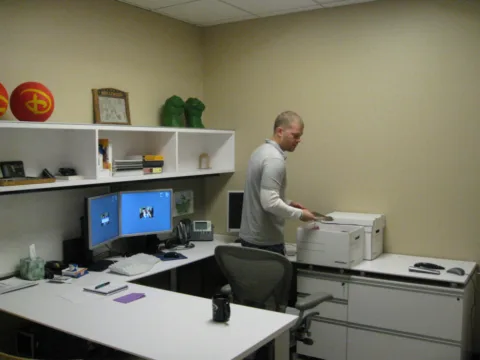Wondering how to quit a job? Quitting a job you don’t like can be a wildly cathartic experience.
Take it from me, I recently left a job where I was really underutilized and under appreciated (no violin playing here — I promise).
Burning the building to the ground would be illegal, and isn’t really my style, but surely nobody faulted me for wanting to finally tell my colleagues what I really thought of working with them.
Unfortunately, while that would’ve felt fantastic at the time, I knew that I’d regret that behavior down the road.
My situation was like this — I was in a supervisory role and I loved the team that worked for me. My problem was with upper management and my peers, not those that worked for me.
Therefore, I felt obliged to follow these recommendations when I was faced with wondering how to quit my job. Here’s how to walk out on a job you hate without compromising your dignity or your good relationships.
#1 – Resist the Urge to Brag
Hopefully, you’re leaving your current job for a better opportunity. I was — yay for me!
As tempting as it may be to chatter away about your new corner office, paid half-days off and improved benefits package, keep that conversation for your friends outside of work.
Otherwise, don’t be surprised if people start giving you the cold shoulder.
As I mentioned, I moved on to a way better job but I was leaving a team that worked hard for me and were so supportive. They were happy for me for my opportunity, but were very sad to see me go.
I gave very little details about my “work-from-home, can’t believe I get paid to do this” job to preserve the good morale that I brought to the team and I genuinely wanted to keep in touch with some of them (we’ll get into that later).
#2 – Keep Going Till the Finish Line
When you know you’re going to be leaving soon, it’s sometimes difficult to work up the motivation to continue to do a great job. But doing that up until your last day is exactly what people will remember.
If you use up all of your sick days and stop being productive, however, that’s what you’ll be remembered for. If I’d done that, all of the hard work I did would’ve been overshadowed by me “slacking” at the end.
Plus, when you hang in there you show a good work ethic, are more likely to get a good reference, and you’ll feel better about yourself. Are you afraid you’re being watched even more now?
You’re right to be paranoid. The company is always watching you, and there’s a record of everything you do: every phone call, every text, every tweet and instant message. At most companies, they save that data forever. Source
On top of that, when you start your new job, you’ll be in a more productive mindset than if you’d spent the last couple of weeks playing Facebook games and shirking your responsibilities. So even though it may be the last thing on earth you feel like doing, give your job your full attention.
#3 – Hold Your Tongue
The exit interview might seem like a perfect opportunity to chew your boss out over her idiotic policies and micromanaging attitude. But wait – do you think you might need to ask her for a reference one day?
If so, keep your mouth shut and a smile plastered across your face. You may want to write a resignation letter as well, but have someone review it for you before you hit “send”.
The same goes for any co-workers you might have less-than-cozy feelings towards. Perhaps a few years down the road, you’ll be applying to a job in their new workplace.
TIP: Speaking of references, you should ask for one immediately so that your hard work is fresh on the minds of those writing the reference. If you forgot before you quit your job, here’s how to ask for a reference after the fact.
#4 – Tidy Up After Yourself
Imagine how you’d feel on the first day of your new job if you discovered a stack of incomplete work, a laundry list of missed deadlines, and a mess of documentation left behind by a previous employee.
Earn some karma points by making sure that whoever replaces you doesn’t have to suffer through that. Tie up any loose ends and make clear notes of upcoming appointments or deadlines.
Communicate with co-workers about anything extra that may fall onto their plates. People will (hopefully) appreciate your diligence, and you’ll enjoy the sense of closure. Sometimes this is difficult to do.
Take my situation for example. I wanted the smoothest transition possible for the team that I hated to leave so I:
- Saved helpful files on the company Google drive.
- Offered to train the new supervisor taking my spot.
- Gave 4 weeks notice prior to my last day.
Unfortunately, my efforts weren’t acknowledged or appreciated but I still felt good about myself doing everything I could to leave my job in better shape than when I took it.
#5 – Stay In Touch
Don’t be a fair-weather office mate. If there’s anyone from your old workplace who you genuinely liked, make the effort to meet for lunch or a cup of coffee.
If you didn’t particularly care for anyone, use LinkedIn or other social networks to stay loosely connected.
You don’t need to waste time on people you really can’t stand, of course, but a few minutes being courteous with old acquaintances won’t kill you and may improve your professional prospects in the future.
https://youtu.be/yYvqZjWuls4
Quitting your job can be tough, but following these tips will ensure that you don’t make any enemies along the way. Just remember: there’s a right way and a wrong way to quit your job. The way that feels good at the time may leave you with regrets.
More Resources On Quitting Your Job
In addition to the links I’ve included above, here are some additional resources to help you quit your job without burning bridges or making enemies:










